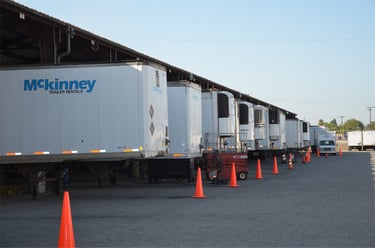 Trailer rentals and semi-trailers for lease come equipped with the standard features, maintenance and compliance that every business needs in its fleet. They’re a turnkey, cost-effective solution to common transportation challenges like seasonal spikes or large fluctuations in demand, but did you know that they can also be customized based on your freight? Before signing a trailer rental or lease agreement, don’t be afraid to ask for the exact specifications that you need to ensure a smooth ride and successful, undamaged delivery. Here are a few semi-trailer specs to compare and consider:
Trailer rentals and semi-trailers for lease come equipped with the standard features, maintenance and compliance that every business needs in its fleet. They’re a turnkey, cost-effective solution to common transportation challenges like seasonal spikes or large fluctuations in demand, but did you know that they can also be customized based on your freight? Before signing a trailer rental or lease agreement, don’t be afraid to ask for the exact specifications that you need to ensure a smooth ride and successful, undamaged delivery. Here are a few semi-trailer specs to compare and consider:
Air Ride vs. Spring Ride Suspension (and the X Factor)
A trailer’s suspension system helps it handle bumps on the road by maintaining tire contact with the pavement. Well-maintained suspension gives the driver better control of the vehicle, enabling them to reduce airborne thumps and, in turn, keep the freight safer from shock. While performance is always the most important factor of any vehicle component or system, selection makes a difference too, when it comes to the different suspension systems available in trailers. The two most common types are air ride and spring ride suspension.
True to their names, air ride suspensions use air-filled bags to absorb shock, whereas spring ride suspensions use steel strips and coil leaf springs. Air ride is generally smoother and quieter, but spring ride will typically last longer and require less maintenance. Choosing between the two is a matter of comparing the costs and considering the freight. With any suspension system, however, proper tire inflation is essential for safety as well as fuel economy. Low and high tire pressure alike can strain the suspension system since it revolves around tire impact. Mckinney Trailer Rentals is the only trailer rental company with tire inflation as a spec on its standard fleet.
Flat Floor vs. Duct Floor Reefer (Airflow 101)
Refrigerated or “reefer” trailers bring on several additional specs to be mindful of, starting with the floor of the trailer. Flat floor reefers have just that — a flat floor — with no obstructions. Duct floor reefers are designed with a slightly raised floor made of aluminum grating.
Which works best and when? A flat floor reefer is ideal for freight in flat pallets or containers, such as milk cartons, because the flatness allows for easy loading and unloading. However, it may not be ideal for fragile items because there could be a lack of security and stability if the trailer isn’t fully packed. Meanwhile, the grooves of a duct floor reefer can provide extra stability along with shock absorption.
The overriding factor, though, is airflow. Those milk cartons we mentioned don’t necessarily need airflow underneath to keep them cold because they’re likely sitting in open crates designed with holes for that very purpose. The flat cardboard of boxed produce, on the other hand, would restrict airflow when placed on a flat floor, potentially causing the food to spoil, thus requiring a duct floor. Stacked boxes on flat flooring can also block air from flowing to the front of the trailer, once again illustrating the need for duct flooring. Keep in mind that a duct floor can be converted to a flat floor, but not vice-versa. Mckinney offers both options regardless.
Chute or No Chute? (Airflow 102)
If you have full loads of refrigerated freight that will be stacked to the ceiling, consider renting or leasing a reefer trailer with a vinyl chute that bolts to the ceiling and hangs down a couple of inches. The chute serves as a channel for air circulation without disrupting what’s stacked. As the refrigeration runs, it will pull hot air in, convert it to cold air and then push that cold air across the load. The constant flow helps keep the entire load properly cooled, preventing the dead spots that might otherwise occur without a chute.
As with the floor, the chute is all about airflow. Most refrigerated trailers have a duct floor and chute. A chute is relatively easy to install or uninstall, so it’s not as much of a pre-leasing consideration as a flat floor that can’t be altered to include ducts.
More Features, More Flexibility
The suspension, floor and chute are just a few of the many specs to discuss with your trailer rental company. There’s also the question of a ramp vs. liftgate for loading, e-track vs. logistics posts to secure the freight and other features like scuff liners, interior lighting, reinforced flooring and more.
Whether you’re looking to rent, lease or buy trailers, Mckinney can work with you to make sure you get the specs you need for your fleet. We even have multi-temperature reefer trailers that allow you to divide a trailer into separate sections and temperatures. In addition to custom trailer specs, Mckinney provides full-service maintenance and fast, reliable support. Start making any number of our 35,000 trailers uniquely yours so you can leverage the efficiency and cost savings of trailer rentals for your business. Request a quote today.



